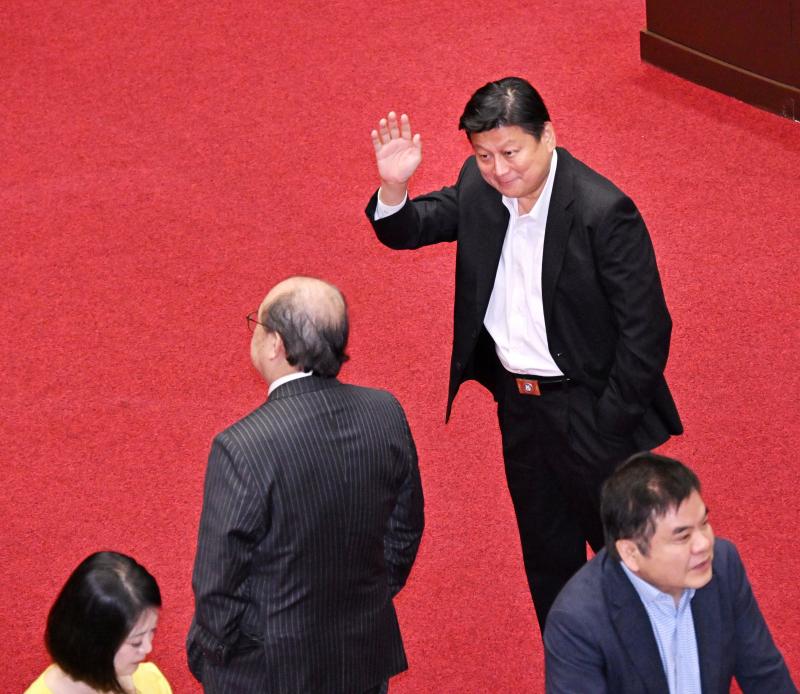A group of 17 Chinese Nationalist Party (KMT) legislators departed on Friday for China, saying before their flight that they believe the trip is the right decision despite criticism from the opposition.
The lawmakers led by KMT caucus whip Fu Kun-chi (傅崐萁) held a news conference at Taiwan Taoyuan International Airport at 2:30pm before their flight.
They were met by protesters and supporters, with both sides holding placards either criticizing them for leaving amidst natural disasters or calling for cross-strait interaction.

Photo: Fang Pin-chao, Taipei Times
In addition to Fu, other members of the delegation include KMT legislators Chang Chih-lun (張智倫), Liao Hsien-hsiang (廖先翔), Chen Hsueh-sheng (陳雪生), Chen Yu-chen (陳玉珍), Huang Jen (黃仁), Weng Hsiao-ling (翁曉玲), Cheng Cheng-chien (鄭正鈐), Lin Chien-chi (林倩綺), Chiu Chen-chun (邱鎮軍), Yu Hao (游顥), Lin Pei-hsiang (林沛祥), Hsu Hsin-ying (徐欣瑩), Sasuyu Ruljuwan and Sra Kacaw.
As the morning’s legislative procedures ended early, KMT legislators Lo Ming-tsai (羅明才) and Wang Hung-wei (王鴻薇) reportedly decided to join last minute.
Speaking to reporters at the legislature in the morning, Huang said that the party’s lawmakers had heard the public’s response to the trip, but decided that the people’s livelihood is the most important thing.
There should be positive interaction in cross-strait relations, he said.
Weng said she hopes to share Taiwan’s agricultural and fishery products with “Chinese friends.”
There is no wrong time to promote economic exchange, she said, adding that if the Democratic Progressive Party would not do it, the KMT will.
Cheng said that the group has still not seen the itinerary, but trusts that Fu will organize it well.
He denied that they were sworn to secrecy, saying only that they did not ask many details.
Chen said that the main goal of the visit was to convey to China the desire for peace, resumption of tourism and promotion of cross-strait development.

Alain Robert, known as the "French Spider-Man," praised Alex Honnold as exceptionally well-prepared after the US climber completed a free solo ascent of Taipei 101 yesterday. Robert said Honnold's ascent of the 508m-tall skyscraper in just more than one-and-a-half hours without using safety ropes or equipment was a remarkable achievement. "This is my life," he said in an interview conducted in French, adding that he liked the feeling of being "on the edge of danger." The 63-year-old Frenchman climbed Taipei 101 using ropes in December 2004, taking about four hours to reach the top. On a one-to-10 scale of difficulty, Robert said Taipei 101

Nipah virus infection is to be officially listed as a category 5 notifiable infectious disease in Taiwan in March, while clinical treatment guidelines are being formulated, the Centers for Disease Control (CDC) said yesterday. With Nipah infections being reported in other countries and considering its relatively high fatality rate, the centers on Jan. 16 announced that it would be listed as a notifiable infectious disease to bolster the nation’s systematic early warning system and increase public awareness, the CDC said. Bangladesh reported four fatal cases last year in separate districts, with three linked to raw date palm sap consumption, CDC Epidemic Intelligence

Two Taiwanese prosecutors were questioned by Chinese security personnel at their hotel during a trip to China’s Henan Province this month, the Mainland Affairs Council (MAC) said yesterday. The officers had personal information on the prosecutors, including “when they were assigned to their posts, their work locations and job titles,” MAC Deputy Minister and spokesman Liang Wen-chieh (梁文傑) said. On top of asking about their agencies and positions, the officers also questioned the prosecutors about the Cross-Strait Joint Crime-Fighting and Judicial Mutual Assistance Agreement, a pact that serves as the framework for Taiwan-China cooperation on combating crime and providing judicial assistance, Liang

US climber Alex Honnold left Taiwan this morning a day after completing a free-solo ascent of Taipei 101, a feat that drew cheers from onlookers and gained widespread international attention. Honnold yesterday scaled the 101-story skyscraper without a rope or safety harness. The climb — the highest urban free-solo ascent ever attempted — took just more than 90 minutes and was streamed live on Netflix. It was covered by major international news outlets including CNN, the New York Times, the Guardian and the Wall Street Journal. As Honnold prepared to leave Taiwan today, he attracted a crowd when he and his wife, Sanni,